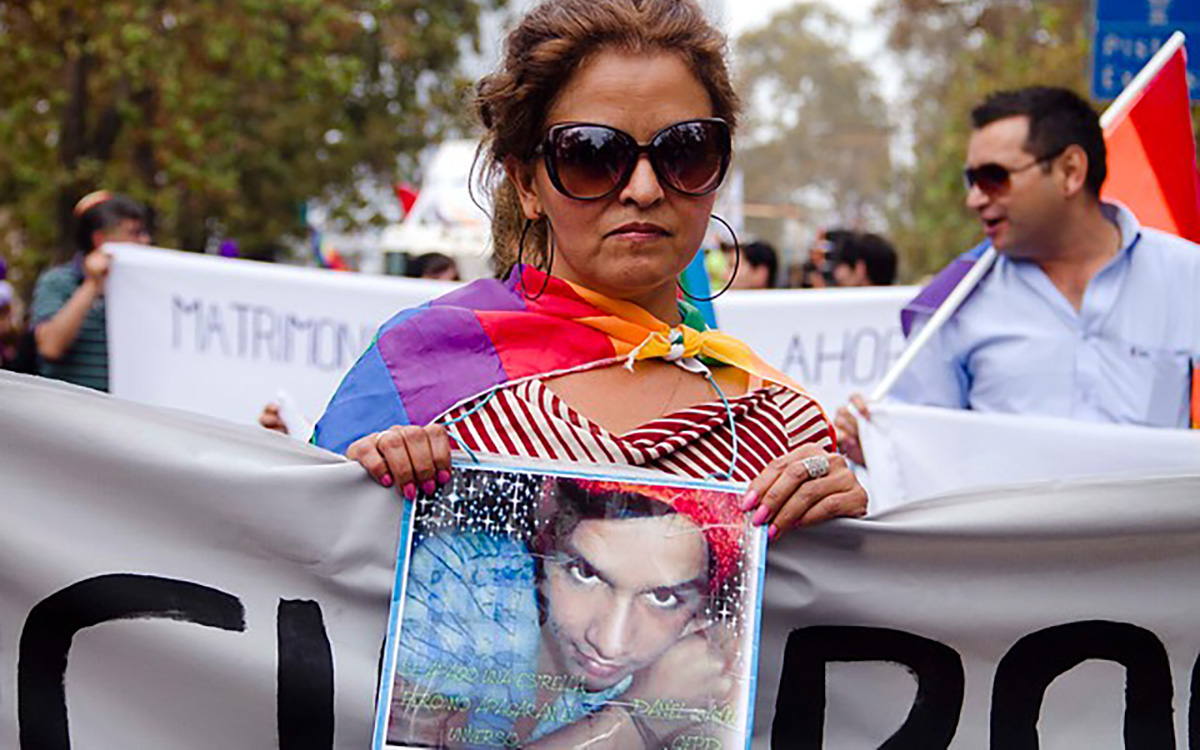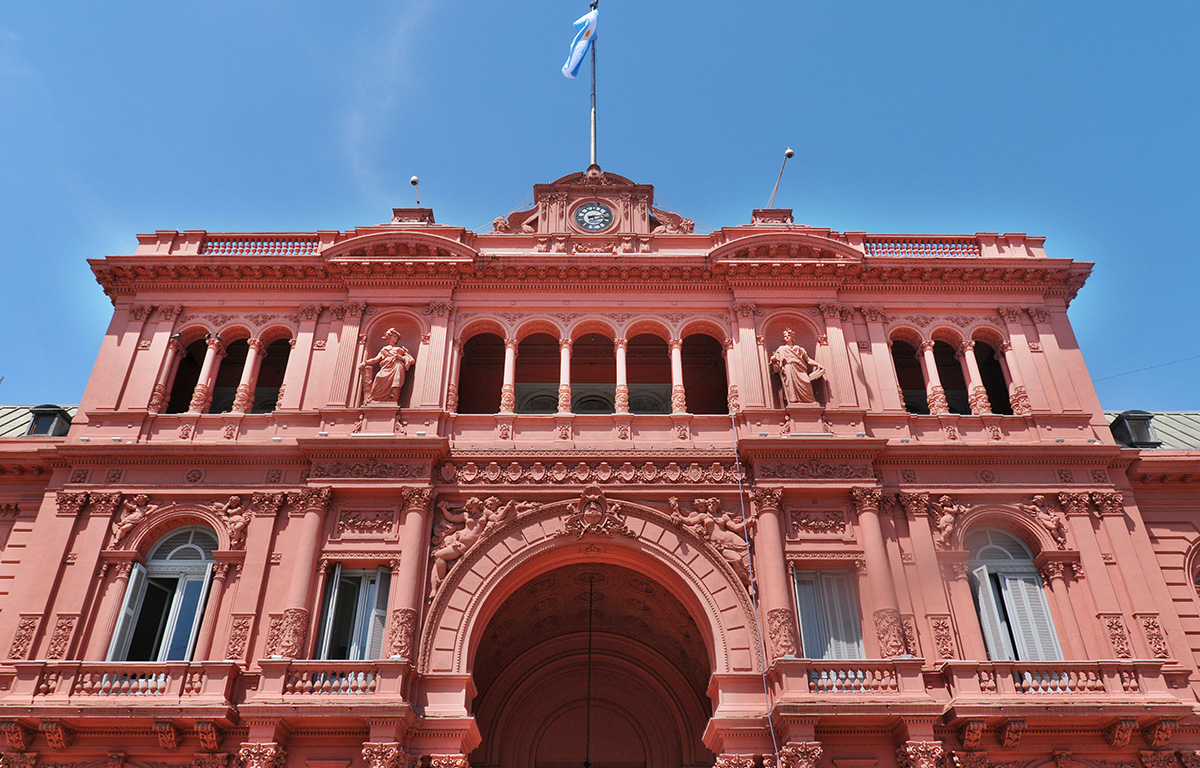South America
First transgender congresswoman in Chile details legislative agenda
Emilia Schneider was student protest leader before election

VALPARAÍSO, Chile — Emilia Schneider, a well-known activist and student leader, on March 11 became Chile’s first transgender congresswoman. Her path to politics, however, began years earlier.
Schneider gained public notoriety in 2018 through her role as spokesperson for the Chilean 8M Feminist Coordinating Committee during the feminist demonstrations that took place in the country that year. She became the first trans president of the University of Chile Student Federation in 2019.
Schneider’s great-grandfather was Gen. René Schneider, who commanded the Chilean Army from 1969 until his assassination the following year.
Before her election, Schneider was a candidate for the Constitutional Convention, the body in charge of drafting Chile’s new constitution. She lost that election, but she won a seat in Congress a few months later.
For her, being the first trans woman in the Chamber of Deputies is “a great joy.”
“It gives a sense and a projection to the social struggles in which I have had to participate: The student struggle, the feminist struggle, the struggle of sexual dissidence,” Schneider told the Washington Blade. “So, I think for me it was like feeling a recognition for the work I have done and also in collective terms the responsibility of representing a community that had never had representation in a space like this.”
“It is an honor for me, it is a pleasure to represent our community, but a great challenge,” added Schneider. “I know that there are many demands, many issues, because there are many years, decades, centuries of exclusion, discrimination and violence through which the trans community has lived. It’s a very structural issue, so it is a challenge, but I am also very grateful because the (LGBTQ) organizations that worked before me made it possible and paved the way for (me.) It’s a very, very big joy in personal and collective terms.”
Schneider is a member of Comunes, a leftist political party that is part of the Frente Amplio coalition whose candidate, Gabriel Boric, won the presidential election.
She told the Blade she has “felt comfortable because we have been able to put our stamp on the deputy’s office.”
“I am also very grateful for the team we have formed, which has worked very well with the Congress’ workers and also with the trust we have developed with our Frente Amplio and Apruebo Dignidad (a political party aligned with Boric) benches and some of the pro-government benches and well,” said Schneider. “The biggest challenge has been to learn to be part of a Congress that is part of a government, that is pro-government.”
When asked if she had experienced transphobia inside the Congress, the congresswoman said “not on the part of the officials of the Congress, to the contrary.”
“They have received my team very well; which is a team composed mainly of women, people of sexual diversity,” said Schneider. “But undoubtedly there is a far-right bench in Congress that constantly tries to provoke fictitious discussions that question the rights of trans people.”
“We have had to listen to several hate speeches coming from the ultra-right wing bench, but it is also very interesting to see how the struggle of (people of) diverse sexualities has also advanced in Congress,” she added. “Before they were small groups of deputies fighting for our rights and today I think it is something much more transversal. In fact, we recently presented a bill to improve the Gender Identity Law, to include trans children and non-binary identities, among other issues, to improve it and it has the signature of different benches, something very transversal and also of Erika Olivera, who is a right-wing congresswoman.”
Schneider added she believes “this also shows that if there is a will, it is possible to build these dialogues despite the differences.”
A law that recognized the right to identity and allows trans people to amend their birth certificates administratively took effect in 2018. Some of the LGBTQ organizations that celebrated the advance, however, have said it is insufficient and must be reformed. They have called for public policies that will benefit trans people who have been historically discriminated against by the State and society.
“I would say that there is a radical absence of public policies, and therefore a tremendous abandonment that is evident not only in those who have not managed to access education and do not find a job, but also to the large population of trans women who are engaged in sex work,” said Schneider. “The economic precariousness, the mental health problems, the lack of access to education and continuity of studies, the lack of access to health care, the number of trans people living on the streets.”
“I would speak of a tremendous lack of public policies and a very radical abandonment of the trans population in Chile, in spite of the fact that in the last time we have obtained symbolic advances and in very big cultural terms,” lamented the congresswoman. “I believe that today there is a common sense of the majority citizenship that it is important to recognize the rights and equality of trans people and to make a reparation also for the bad things that have happened to our community.”
Schneider said Boric’s presidency could mean an improvement in trans people’s life.
La Moneda, the Chilean presidential palace, on March 31 hosted an event that commemorated the International Transgender Day of Visibility. Schneider participated in the ceremony during which the trans Pride flag was raised.
“We are on the right track because the government has already announced a working group that has begun to operate in various ministries and also with the sexual diversity bench in Congress,” she said. “I believe that this situation of neglect and lack of public policies will change. This government has had a very clear commitment with the community and sexual diversities in general.”
Schneider is one of four out LGBTQ women in Congress.
She told the Blade they will work to reform Chile’s anti-discrimination law and include non-binary and intersex people and children in the Gender Identity Law. Schneider also said they support a trans labor quota in the public and private sector.
South America
Daniel Zamudio murderer’s parole request denied
Raúl López Fuentes convicted of murdering gay man in Chilean capital in 2012

Chile’s Parole Commission on Tuesday rejected a request to allow one of the four men convicted of murdering Daniel Zamudio in 2012 to serve the remainder of his sentence outside of prison.
Raúl López Fuentes earlier this month asked the commission to release him on parole. Zamudio’s family and members of the Movement for Homosexual Integration and Liberation, a Chilean LGBTQ rights group, had gone to court to block the request.
Among the arguments put forward that influenced the commission’s decision is what Movilh categorized as his “high risk of recidivism, linked to the adherence of an antisocial behavior with a tendency to minimize his acts transgressing social norms.”
The commission pointed out that López has psychopathic traits because he is aware of the damage he did to Zamudio and his family.
“In addition, he maintains a high risk of violence, not being advisable to grant the benefit,” the report said.
Zamudio was a young Chilean man who became a symbol of the fight against homophobic violence in his country and around the world after López and three other young men with alleged ties to a neo-Nazi group beat him for several hours in Santiago’s San Borja Park on March 2, 2012. Zamudio succumbed to his injuries a few weeks later.
The attack sparked widespread outage in Chile and prompted a debate over homophobia in the country that highlighted the absence of an anti-discrimination law. Lawmakers in the months after Zamudio’s murder passed a law that bears Zamudio’s name.
López in 2013 received a 15-year prison sentence after he was convicted of killing Zamudio. Patricio Ahumada received a life sentence, while Alejandro Angulo Tapia is serving 15 years in prison. Fabían Mora Mora received a 7-year prison sentence.
Zamudio’s mother, Jacqueline Vera, exclusively told the Washington Blade after the commission rejected López’s request that “we as a family are calmer.”
“Even with my husband we were in a lot of pain at the beginning. It was like a blow of very strong emotions, so we tried to stay calm because we still had to solve the problem,” Vera said. “We had four days to solve it.”
López will have to serve the remaining three years of his sentence before his release.
“I will continue working to improve the Zamudio Law and so that this murderer does not leave prison because he is a danger to society, he does not represent repentance and people like this cannot be free,” she said. “For the same reason, we have to work so that hate crimes have life imprisonment and that is what we will concentrate on.”
South America
Man convicted of killing Daniel Zamudio in Chile seeks parole
Raúl López Fuentes in 2013 sentenced to 15 years in prison

One of the four men convicted of murdering a young gay man in the Chilean capital in 2012 is seeking parole.
Raúl López Fuentes in 2013 received a 15-year prison sentence after he was convicted of killing Daniel Zamudio.
Zamudio was a young Chilean man who became a symbol of the fight against homophobic violence in his country and around the world after López and three other young men with alleged ties to a neo-Nazi group beat him for several hours in Santiago’s San Borja Park on March 2, 2012. Zamudio succumbed to his injuries a few weeks later.
The attack sparked widespread outage in Chile and prompted a debate over homophobia in the country that highlighted the absence of an anti-discrimination law. Lawmakers in the months after Zamudio’s murder passed a law that bears Zamudio’s name.
Patricio Ahumada received a life sentence, while López and Alejandro Angulo Tapia are serving 15 years in prison. Fabían Mora Mora received a 7-year prison sentence.
López has asked the Seventh Santiago Guarantee Court to serve the last three years of his sentence on parole. Zamudio’s family and Jaime Silva, their lawyer who works with the Movement for Homosexual Integration and Liberation, oppose the request.
Movilh represented Zamudio’s family after his murder.
Zamudio’s mother, Jacqueline Vera, during an exclusive interview with the Washington Blade said López’s petition “provoked all the anguish, all the commotion of his time.”
“It was very cruel because in fact two days before we were at Daniel’s grave, where it was 12 years since his death and the beating,” said Vera. “He really does not deserve it.”
“We have gone through very difficult moments,” she added.
The mother, who later created a foundation to eradicate discrimination in Chile, was emphatic in indicating that she and her family “do not accept the release of this guy because he is a danger to society and a danger to ourselves.”
“At the last hearing where they were sentenced, they told us that we are going to remember them when they get out,” said Vera. “They threatened us with death. There is a video circulating on social networks where they were in front of me and they laughed and made fun of me. They told me that I remembered that I had three more children.”

Regarding the possibility that the Chilean justice system will allow López to serve the remaining three years of his sentence on parole, Vera said “with the benefits here in Chile, which is like a revolving door where murderers come and go, it can happen.”
“In any case, I don’t pretend, I don’t accept and I don’t want (López) to get out, I don’t want (López) to get out there,” she said. “We are fighting for him not to get out there because I don’t want him to get out there. And for me it is not like that, they have to serve the sentence as it stands.”
LGBTQ Chileans have secured additional rights since the Zamudio Law took effect. These include marriage equality and protections for transgender people. Advocacy groups, however, maintain lawmakers should improve the Zamudio Law.
“We are advocating for it to be a firmer law, with more strength and more condemnation,” said Vera.
When asked by the Washington Blade about what she would like to see improved, she indicated “the law should be for all these criminals with life imprisonment.”
South America
Argentine president announces state institutions can no longer use inclusive language
Activists condemn Javier Milei’s anti-LGBTQ policies

In a move that has generated concern and criticism throughout the country, Argentine President Javier Milei has announced government institutions can no longer use inclusive language and gender-specific references in their public policies.
This decision comes on top of other controversial measures, such as the closure of the Women, Gender and Diversity Ministry, and an announcement to shutter the country’s National Institute against Discrimination, Xenophobia and Racism.
Former Diversity Undersecretary Alba Rueda, a transgender woman who was the country’s special envoy for LGBTQ issues under former President Alberto Fernández’s government, and gay Congressman Esteban Paulón, in exclusive interviews with the Washington Blade discussed the impact of Milei’s announcement and the impact it will have on Argentine society in terms of human rights and protections for queer people.
“The State had been using the gender perspective and inclusive language to make visible the presence of women in key roles and to recognize nonbinary identities,” Rueda said. “This measure not only erases those advances, but also excludes people who are already recognized by the State in their nonbinary gender identities.”
Rueda noted Congress more than a decade ago “passed the gender identity law, which states in its first article that the State will respect the gender identity of all persons. After changes were made in the structure of the State to be able to generate identity documents, a series of court rulings that recognize nonbinary people in their nonbinary identity arose in 2016, and this (and) that remained unresolved during the Macrista government without recognizing the identity of nonbinary people.”
She pointed out Fernández’s government in 2021 issued Decree 746, which recognized “people with nonbinary identities, gender fluid and those who avoid naming their gender before the State.”
“The State already recognizes this citizenship and here comes that the prohibition of inclusive language excludes in the way of naming people who are already recognized by the State and that effectively the recognition of their gender identity is the condition of not being binary,” said Rueda. “So, the decree is in force, the law is in force, there are nonbinary people with their documents, but who today are not being named in all state documents.”
Paulón said the prohibition of inclusive language is a gesture of violence towards LGBTQ communities.
“Inclusive language has given entity and identity to an important part of the Argentine population,” he said. “This measure represents an act of harassment and violence towards those who identify with inclusive language, including the queer and LGBTQ+ collective.”
“Language is a social and cultural construction, and in Argentina today inclusive language represents and has given entity and identity to an important segment of the population and to a series of social collectives,” added Paulón. “Therefore, something that is not created by decree can hardly be eliminated by decree.”
The congressman told the Blade that Milei’s government announcement was “something that was clearly going to happen.”
“I don’t see the government campaigning in inclusive language or celebrating diversity,” said Paulón.
Milei’s decision has generated intense debate in Argentina, with critics arguing these measures represent a step backwards in the protection of human rights and an attack on diversity and inclusion. Milei’s supporters, on the other hand, defend these measures as part of an effort to promote conservative policies and reinforce national identity.
“It is very serious because it limits the exercise of citizenship and affects the nonbinary population, women and the trans population that is not recognized within the gender binarism,” said Rueda.
She noted Milei during his presidential campaign raised these issues, and has decided to implement policies that harm women and LGBTQ people.
“This is the gravity that is lived today in Argentina, that the Argentine head of state puts in confrontation and reduction of rights to women and LGBTIQ+ people,” Rueda added.
This ban on inclusive language and gender-specific policies has been announced against the context of increased political and social polarization in Argentina. With inflation at alarming levels and an economy in crisis, Milei’s government has sought to consolidate its base by adopting controversial measures that have generated division and unrest in Argentine society.
“That is the institutional and democratic gravity today in Argentina, that the head of state attacks and creates internal enemies and that position is accompanied by the media, amplifying a negative message about our communities,” Rueda said. “Of course that translates into social networks, but it also translates into the attacks that we LGBTIQ+ people experience in the public sphere.”


















